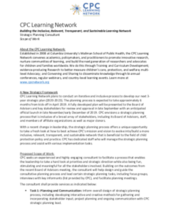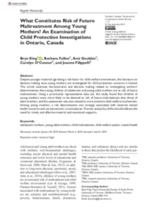Displaying 1131 - 1140 of 2503
Excavators have reportedly found the remains of 27 people on the site of "one of the largest institutions for young offenders in the US" which closed in 2011 but was previously known for the "alleged abuse and murder of children over its 111-year history."
The aim of this study was to investigate the role of self-esteem as a mediator in the association between different types of child maltreatment (i.e., physical abuse, physical neglect, emotional abuse) and depressive symptomatology among a sample of adolescents in out-of-home care.
CPC seeks an experienced and highly engaging consultant to facilitate a process that enables the leadership to take a hard look at priorities and strategic direction while also being fun, stimulating and meaningful for all the stakeholders involved.
The current study comprises a secondary analysis of the 2013 Ontario Incidence Study of Reported Child Abuse and Neglect and focuses on the decision to provide ongoing child welfare services.
This study sought to determine whether the Parent Support Outreach (PSO) program, an early Child Protective Services (CPS) response and service model to screened-out reports and other high-risk families in Minnesota's child welfare system, resulted in less subsequent CPS involvement, increased use of mental health and substance abuse services, and improvement of family's economic well-being.
This comprehensive long-form article from Indian Country Today explores the history of family separation in the Indigenous communities in the United States, including the forcible placement of Native children into boarding schools in the 19th century, the "Indian Adoption Project" of the 1950s and 1960s, and the current overrepresentation of Native children in the US child welfare system.
According to this article from the New York Times, "it may take federal officials two years to identify what could be thousands of immigrant children who were separated from their families at the southern United States border, the government said in court documents filed on Friday."
This article examines characteristics and decision making related to investigating workers’ determinations that young children of adolescent and young adult mothers are at risk of future maltreatment.
In this study, qualitative interview data were used to explore parental separation and coping strategies among newcomer immigrant adolescents in the US.
In this opinion piece for the New York Times, Sindy Flores, a mother and migrant to the US from Honduras, writes about her experience of family separation in the US.


